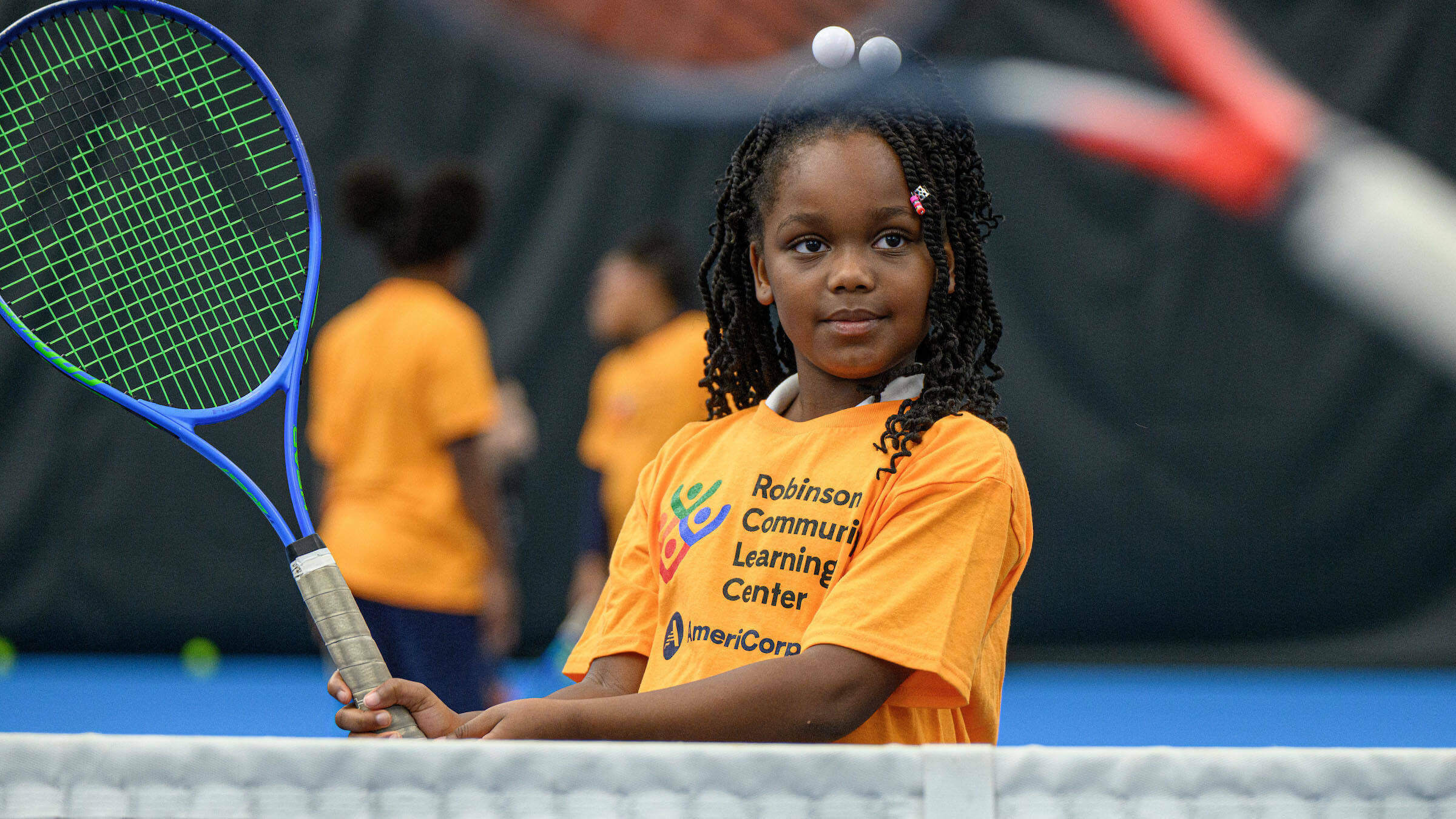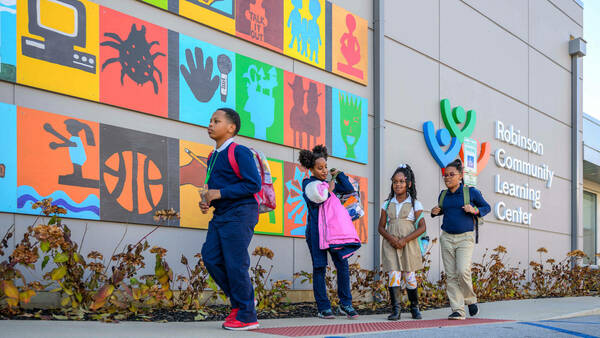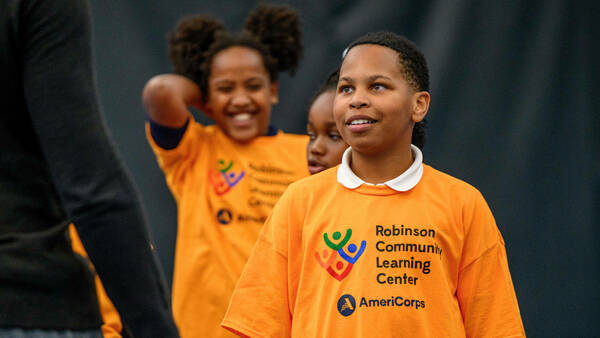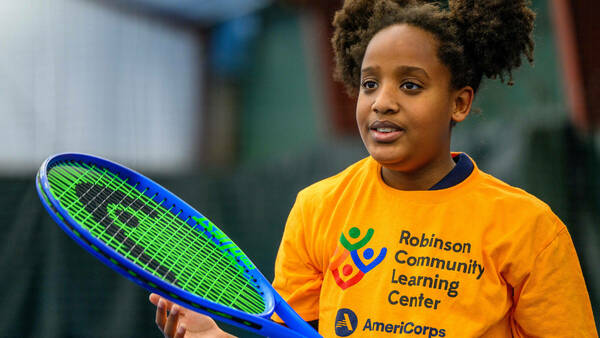Pilot program helps Robinson Center youth pursue passion for tennis

Ryleigh Crump walks the court in a bright orange top, Robinson Community Learning Center printed across the front, collecting fuzzy yellow tennis balls in a pickup hopper — a metal contraption with folding handles that doubles as a basket.
“Tennis is the best,” the fourth-grader at Kennedy Academy in South Bend says. She’s wearing dark slacks and tennis shoes. Her dark brown hair is up in Afro puffs. “I wanted to play tennis since I was like 5.”
Her favorite player?
“I like Serena Williams and Venus Williams,” she says matter-of-factly.
It’s Tuesday, and Ryleigh and a small group of other kids from the University of Notre Dame’s Robinson Community Learning Center have traveled the 11 miles north from South Bend to Niles, Michigan, for tennis lessons at Lakeland Academy of Tennis, an indoor training facility serving some of the best young tennis players in northern Indiana and southwest Michigan.
It’s part of a pilot program sponsored by the Lakeland Community Tennis Association, the nonprofit arm of Lakeland Academy of Tennis, in collaboration with the United States Tennis Association Northern Indiana chapter.

The kids, all students in the RCLC’s after-school program, travel by van to Niles once per week for the hour-long lessons, Youth Development Program Director Tyonne Johnson at the wheel. The kids perform drills, play games and practice shots alongside other young players of varying levels of experience.
Asked what she’s learned so far, Ryleigh says in a singsong voice, “I learned about my grip, I learned about tennis and … it’s my dream to be a tennis player.”
Nearby, Chrisiah Holman, a fifth-grader at Kennedy Academy, is taking a water break.
“We’ve been learning how to volley and we’ve been learning how to forehand and backhand, which is just hitting (the ball) but in a certain way,” Chrisiah says.
Like Ryleigh, he’s wearing a bright orange RCLC shirt. Dark slacks and red tennis shoes complete the outfit — part of his school uniform. It’s straight from school to the RCLC and then up to Niles for all of the kids.
Asked what he likes most about tennis, Chrisiah says thoughtfully, “It’s a really fun game because some sports either have too much running or too much things that don’t require focus, and I like having focus with lots of things.”
The kids were selected for the pilot based on a pre-existing interest in tennis. The RCLC also looked for kids who would be likely to complete the program. A positive attitude and tenacious spirit were essential. Lakeland Community Tennis Association is paying for the lessons. The USTA Northern Indiana donated the equipment, including balls and matching blue and yellow racquets for each of the kids.
"There are several groups that have been sidelined relative to the grassroots of this expensive sport ... and we're trying to up the participation."
Played by nearly 24 million people in the U.S. and more than 87 million people worldwide, tennis is a lifelong sport that promotes health and well-being for players of all ages.
For young players, especially, it also improves coordination, agility and balance; promotes teamwork and sportsmanship; develops strategic thinking and problem-solving; cultivates social skills; and deepens self-confidence, according to the USTA.
Susan Devetski is the RCLC’s director and a longtime USTA member.
“As an off-campus educational initiative of the University of Notre Dame, the Robinson Community Learning Center aims to provide academic support, enrichment activities and opportunities for positive social interaction for youth of all ages,” Devetski says. “Tennis is a terrific avenue for such endeavors. Among other things, it teaches lessons about teamwork, sportsmanship, discipline and perseverance that will serve our kids well into the future. We’re thankful to Lakeland Community Tennis Association and USTA Northern Indiana for making this pilot possible.”

The Lakeland Community Tennis Association formed in 2022 with a single purpose: to bring professional tennis to the area in the form of a tournament — the now annual USTA Pro Circuit M15K at the University of Notre Dame’s Courtney Tennis Center/Eck Tennis Pavilion.
Since then, the organization has expanded to focus on year-round development and mentorship as well, with particular attention to individuals and groups that, historically, have been excluded from the sport because of lack of access, exposure, money or all of the above.
The organization hosted a Kids Day in conjunction with Juneteenth during this year’s USTA Pro-Circuit tournament. It later hosted groups of RCLC kids on back-to-back Fridays at the Leeper Park Tennis Center in South Bend in partnership with USTA Northern Indiana.
“There are several groups that have been sidelined relative to the grassroots of this expensive sport,” says Auggie Guimaraes, director of Lakeland Academy of Tennis. “A lot of people have been sidelined, and we’re trying to up the participation.”
This aligns with recent efforts on the part of the USTA to expand access to the sport among underserved and minority populations. Just this past year, the organization’s charitable arm, the USTA Foundation, contributed more than $7 million in support, services and funding for National Junior Tennis and Learning chapters. It also awarded scholarships to student leaders and donated equipment to schools. And it helped refurbish courts at public parks and tennis facilities.
A South Bend native, Sarah Stanchin is the tennis service representative for USTA Northern Indiana, where her job involves partnering with local schools and organizations to grow the sport at the grassroots level.
“A big thing with the USTA has been the grassroots and getting into diverse communities,” says Stanchin, a former player and coach.

To be sure, while participation in tennis among Black and Hispanic players has surged in recent years thanks, in part, to the success and popularity of players such as the Williams sisters and Coco Gauff, people of color still represent a minority of the tennis-playing public in the U.S. At the same time, wealth is perhaps the ultimate corollary of participation in the sport. According to recent data, a majority of tennis players in the U.S. earn at least $75,000 per year, while about 4 in 10 earn more than $100,000 per year.
Looking ahead, the RCLC hopes to expand on the pilot so that even more kids can benefit from the game. To that end, it is currently exploring the possibility of becoming a National Junior Tennis and Learning chapter. Among other things, this would allow the center to apply for grants and other assistance through the USTA Foundation, whose mission is to provide tennis and education to under-resourced youth in the U.S.
One critical area of need for the RCLC is in transportation. The center currently uses a minivan to get kids back and forth to Niles, limiting participation to just six passengers. A bigger van or funding for alternative modes of transportation would accommodate more kids.
Originally published by at news.nd.edu on November 21, 2023.
Latest Research
- University of Notre Dame and IBM Research build tools for AI governanceMain Building (Photo by Matt Cashore/University of Notre Dame) …
- Smarter tools for policymakers: Notre Dame researchers target urban carbon emissions, building by buildingCarbon emissions continue to increase at record levels, fueling climate instability and worsening air quality conditions for billions in cities worldwide. Yet despite global commitments to carbon neutrality, urban policymakers still struggle to implement effective mitigation strategies at the city scale. Now, researchers at Notre Dame’s School of Architecture, the College of Engineering and the Lucy Family Institute for Data & Society are working to reduce carbon emissions through advanced simulations and a novel artificial intelligence-driven tool, EcoSphere.
- Seven engineering faculty named collegiate professorsSeven faculty members in the Notre Dame College of Engineering have been named collegiate professors—a prestigious title awarded by the university and college in recognition of excellence in research, teaching and service. The designation may be conferred on faculty at the assistant, associate or…
- ‘A special challenge’: German studies scholar wins National Humanities Center fellowship for research on medieval womenFor CJ Jones, the joy of research is not the answers but the journey. And the next step on that journey is a fellowship with the National Humanities Center. …
- Notre Dame Lead Innovation Team partners with local WIC program to identify, prevent lead poisoning in childrenB.A.B.E. store “shoppers” now have something new to help their families: free lead screening kits offered by the University of Notre Dame’s Lead Innovation Team.
- Notre Dame Welcomes Ninth Cohort of Warrior-Scholars for Transformative Academic JourneyNOTRE DAME, IN – The University of Notre Dame recently concluded its ninth successful Warrior-Scholar Project (WSP) boot camp, hosting 34 dedicated Warrior-Scholars from June 21st to 28th. This intensive, week-long academic residency provided transitioning service members and veterans…













